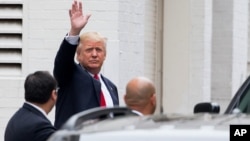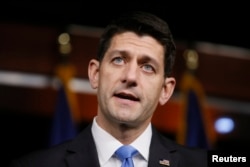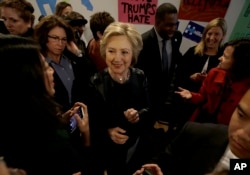The presumptive U.S. Republican presidential nominee, real estate mogul Donald Trump, and the party's top elected official, House of Representatives Speaker Paul Ryan, voiced confidence after meeting Thursday they would eventually unite in their campaign against the likely Democratic nominee, former U.S. Secretary of State Hillary Clinton.
But the scene outside the Republican National Committee where the two men met more closely resembled the raucous, unpredictable presidential contest that brought them here: lawmakers jumped fences, a bagpiper drowned out religious protestors and a group of undocumented immigrants held a mock funeral for the party.
Ryan, who said last week that he was "just not ready" to endorse Trump's maverick campaign, again did not fully embrace his candidacy. But Ryan declared that he was "very encouraged" about unifying with Trump.
"I do believe we are planting the seeds to get ourselves unified," Ryan said. "But this is a process. It takes time. It's very important that we don't fake unification."
For the horde of national and international reporters waiting outside, the wait was long and substance limited.
Trump refrained from his usual propensity for making comments to the media, eluding even the cameras when he departed after the meeting. He was headed for talks with other Republican lawmakers, some of whom have endorsed him and others of whom remain skeptical of his political views and electoral chances against Clinton in the race to become the country's 45th president.
Trump and Ryan said in a joint statement that they "remain confident there's a great opportunity to unify our party and win" November's national presidential election. The two political figures said that "while we were honest about our few differences, we recognize that there are also many important areas of common ground."
Trump and Ryan said, "The United States cannot afford another four years of the Obama White House, which is what Hillary Clinton represents. That is why it's critical that Republicans unite around our shared principles, advance a conservative agenda, and do all we can to win this fall."
Preiebus said in a Twitter message, "The meeting was great. It was a very positive step toward party unity."
Front-runner status
Trump has won nearly 11 million votes from Republicans in the state-by-state nominating contests for his call to deport 11 million illegal immigrants living in the United States, a vow to build a wall along the Mexican border to keep out more migrants, and a proposal to temporarily stop Muslims from entering the U.S.
In the months-long campaign, Trump, who has never held elective office, defeated 16 other Republican contenders, many of them current or former governors and senators.
But some prominent Republicans, including the party's last two White House occupants, President George H.W. Bush and his son, President George W. Bush, have declined to endorse him. Meanwhile, some other party officials who backed Trump's opponents in the presidential nominating contest have now switched their allegiance to the one-time television reality show host who has never held elective office.
What Ryan wants
Ahead of the meeting, Ryan said he would not support Trump until he changes his sometimes harsh campaign rhetoric and voices support for traditional conservative Republican policies. Ryan and some other Republicans are at odds with Trump over his anti-immigration stands, his characterization of Mexican migrants as rapists and drug abusers, and his past denigrating comments about some women, veterans who have been captured as prisoners of war and people with disabilities.
Ryan is slated to chair the party's July national convention, where Trump will be formally nominated. Ryan offered to abandon that ceremonial role if Trump wanted him to, but the Republican front-runner said that he wants him to keep it.
Clinton vs Trump
Trump is facing a difficult national election campaign against Clinton. Six months ahead of the November 8 vote, national surveys show her with about a 6-percentage point lead over Trump.
The winner of the election will succeed President Barack Obama, a Democrat, when he leaves office in January after eight years in the White House.






